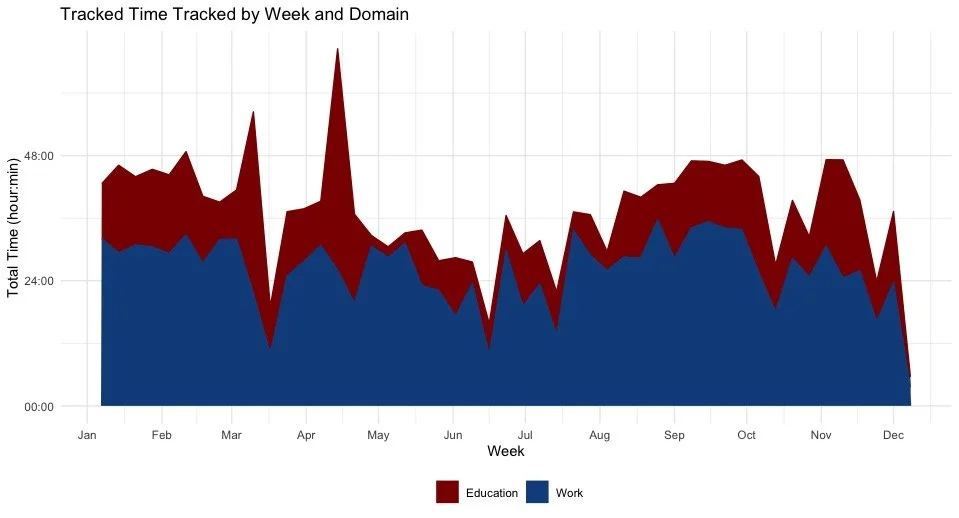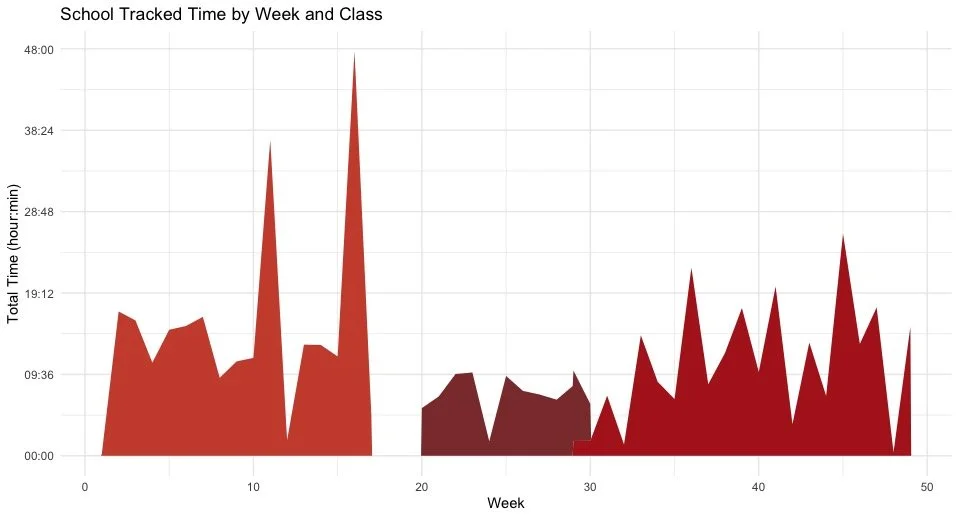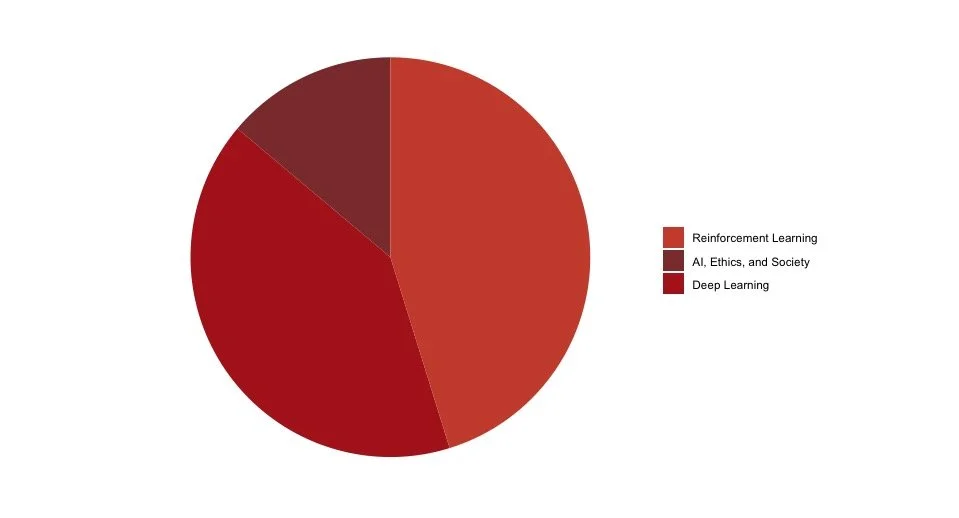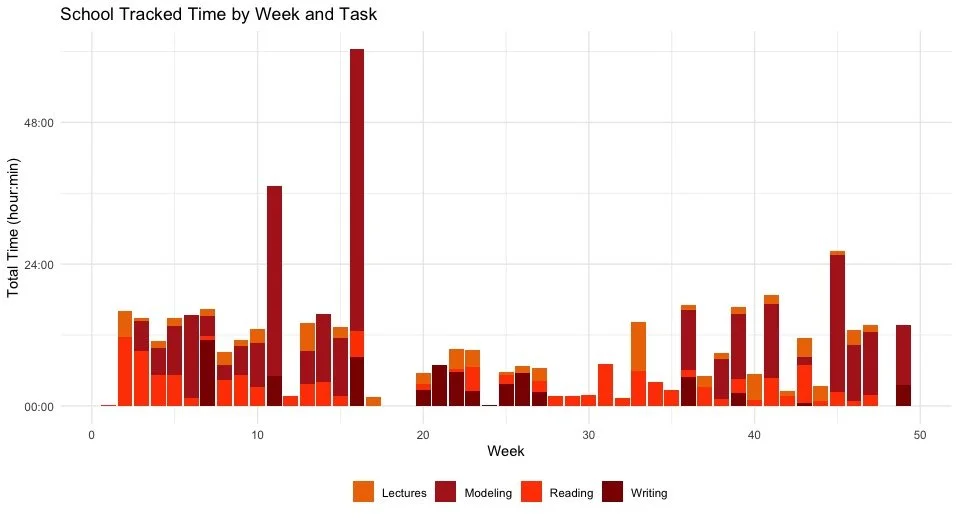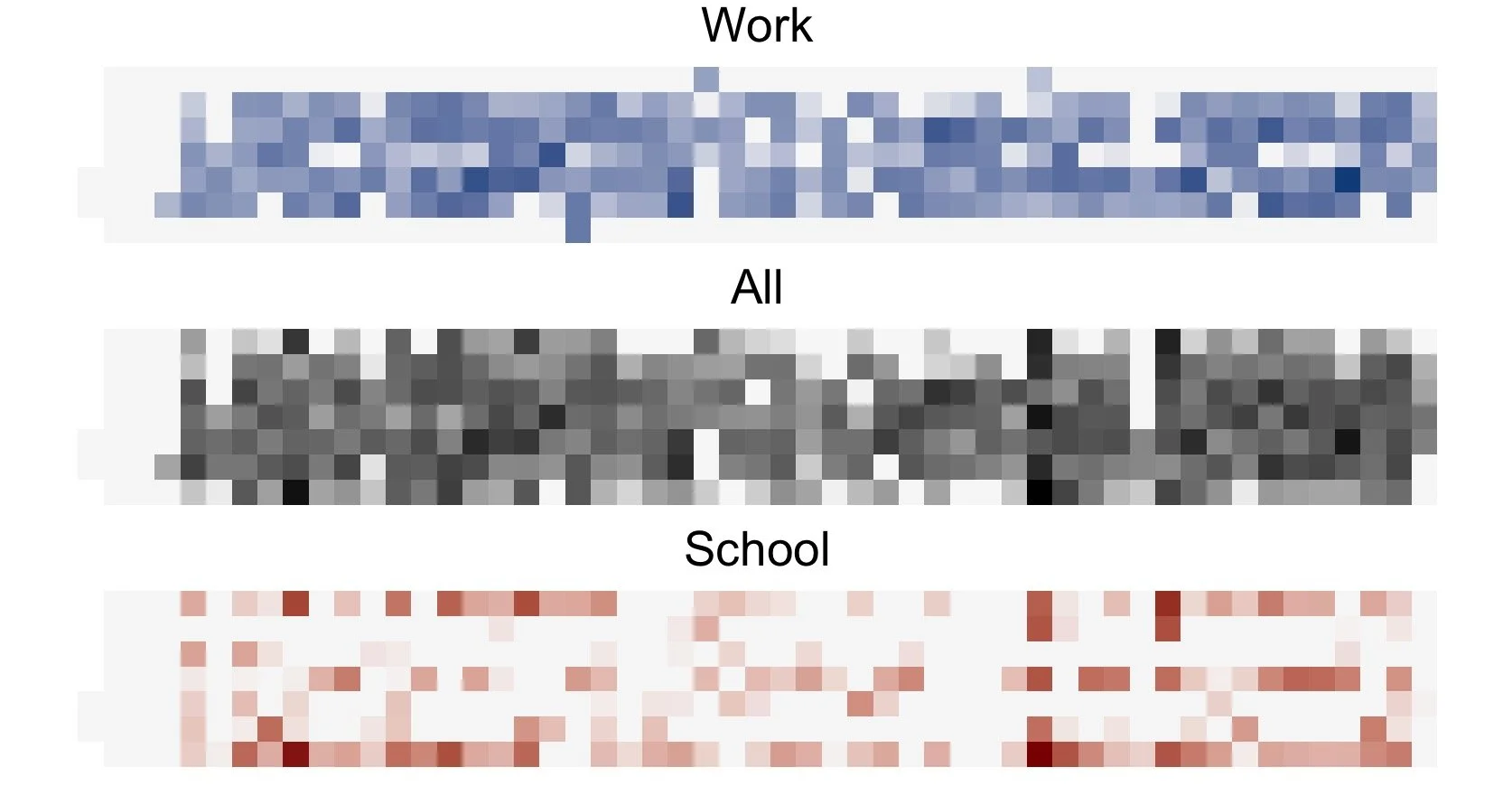2024 Year in Data - Time Tracking
A little bit late and hiding from the wintery mix hitting Indiana, I’m here with the final 2024 Year in Data entry.
I logged 1852 through Dec 9th of this year, including time from 3 classes at Georgia Tech and 20 projects in my role at the Tennessee Valley Authority as well as intentional overhead and ad hoc analyses. I watched lectures, analyzed energy efficiency planning metrics, built models, supported databases, and more.
Contrary to a trend identified in 2023, I maintained a much more reasonable balance of workload in the second half of the year. This is more due to the nature of my work and classes than huge intentional changes on my part. However, I was able to swap my work schedule to work four 10s through most of the year, which enabled me to place better constraints on my schoolwork. This reduced the time I felt guilty about not working, although that's not quantified here.
Out of my main technical skills, I once again did more modeling (machine learning) work than anything else. However, most of my modeling time came from my graduate courses. I built reinforcement learning agents to solve the Overcooked environment, discussed the moral and privacy impacts of AI algorithms, and trained CNNs to detect AI-generated images. At work, I spent more time doing tool development and ad hoc analyses. This included the adoption of major database changes in several R Shiny apps, development of new dashboards, and several large-scale business analytics requests. These types of work came in at second and third overall.
I took 36 days away from my desk completely (25% less than in 2023) and averaged 6.18 hours focused working time on days that I did work. I switched focus or took a break an average of 7 times each working day. December isn't quite complete in this data, but it was particularly rejuvenating. Although these metrics are comparable to 2023, I’m leaving the year with a healthier outlook on my professional and academic commitments.
Work
Of these hours, 6.4 were spent on work across 7 separate time entries on the average day. This doesn't include time spent checking email, responding to messages on Teams, or planning for the week ahead. It only includes time spent working intentionally on TVA projects.
I've usually worked on 4 projects over a day. 2024-05-30, 2024-06-24, and 2024-07-18 were my most "unfocused" days, on which I somehow worked on 9 projects. The last of these days, for example, was spread across database development, dashboarding, metric development, energy efficiency program forecasting, app development, working sessions, and ad hoc analysis. On the bright side, I did have 30 'single-focus' days, which is significantly more than in 2023. These 30 days include conferences, all-hands events, planning sessions, and weekend/school days where I only put in a few hours total.
January involved an unusually high amount of data engineering to bring our new program evaluation database across the finish line (tool development in that month was also dominated by refinements to the downstream dashboards). February contained some modeling for the FY25 Strategic Power Supply Plan cycle, but February through August were dominated by tool development. This involved a significant amount of revisions to adopt our overhauled database designs for energy efficiency and electrification planning data as well as internal client app feature requests for comparisons to goals, Monte Carlo value simulations, measure-level custom program evaluations, further revisions to metrics, and visualizations for supporting data. September and October's tracked time reflects the increased focus on and revisiting of long-term metrics strategy, which is shown as Ad Hoc Analysis.
School
I continued my Master's of Computer Science this year, specializing in Machine Learning at Georgia Tech. In addition to the work day, I spent an average of 3 hours working on school 1 to 2 days during the work week. Most weeks, I was able to work 4 10s at TVA and reserve an extra day for focused school time, which resulted in a higher average over fewer days. I worked both weekend days 28 times and averaged 4.4 hours per weekend day. This includes breaks and down-weeks, which pull down both of those numbers. At the extreme, my longest school day included 14.2 hours of focused time.
Reinforcement Learning narrowly won out as the most time-consuming class of my year. Although I managed the time commitment well during the first half of the course, the second half focused on deep reinforcement learning. Long training times resulted in increased project time at the two obvious peaks. These high-intensity stretches were draining. I took an intentional break after the first, causing a condensed timeline for the second.
AI, Ethics, and Society was a significantly lighter class. In fact, it has been the lowest time commitment of any class I've taken so far. It also involved significantly less actual modeling, focussing on readings and discussion instead. This class also overlapped with my move back to Indiana and summer vacations, which required me to be a bit more efficient than I otherwise might have been.
Because I felt recovered and refreshed after the summer, I then jumped into readings for Deep Learning before the semester started, causing the overlap between my second and third classes this year. Deep Learning took only marginally less time than Reinforcement Learning. It didn't require me to take such intense working sessions but was more variable in week-to-week commitment on average due to varying deliverables each week.
Conclusion
2024 brought with it plenty of gratification and plenty of stress in my professional and academic life. I continue to look for ways to balance the time commitment of my graduate degree against the impact it has on my mental health and other facets of my life. However, it also pays off. I’m very excited to have started a new role at TVA for 2025 (and beyond), and I’ll be interested to see how the makeup of my workload changes as a result. Some changes, like the 4 10s schedule that enabled me to dedicate Wednesdays to school, will have to change. However, I’m hoping to carry forward the habits I’ve built into the next year and adapt where needed.
